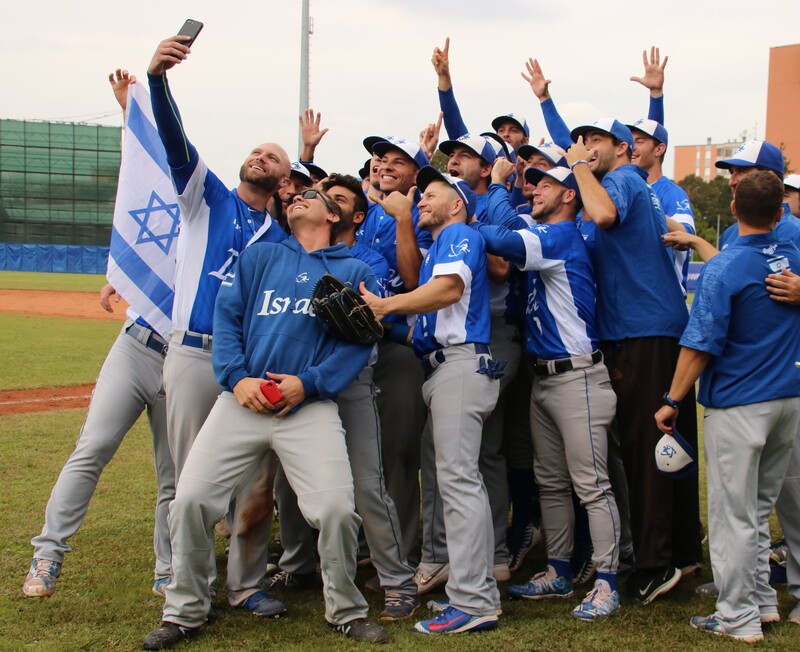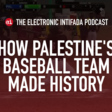The Electronic Intifada 3 March 2023

Almost all of Team Israel’s players were born in the US. (Via Facebook)
Palestinians and their allies are calling on baseball fans to boycott Team Israel at this month’s World Baseball Classic.
Backed financially by the Jewish National Fund, the team serves as a distraction from the human rights abuses and massacres the state and many of its citizens have been carrying out for several decades now, the boycott advocates argue.
The latest official roster for Team Israel indicates that only one of its players was born in the Middle East. The rest are Americans, going out of their way to play for an apartheid state.
Opening next week, the World Baseball Classic is being held in the US, Taiwan and Japan. The competition’s rules do not require players to be citizens of the countries for which they play, only that they are eligible to become citizens.
“While Israel denies Palestinians our UN-sanctioned right to return to the lands from which it ethnically cleansed us,” said Stephanie Adam of the Palestinian Campaign for the Academic and Cultural Boycott of Israel (PACBI), “Israel’s national baseball team makes use of eligibility under Israel’s Law of Return for any person of Jewish heritage to play for the team, regardless of citizenship.”
Palestine’s national team is not playing in the World Baseball Classic. Yet it recently won the silver medal in the West Asia Cup.
It is also composed of mostly American-based players. But unlike Team Israel, each player on Palestine’s national baseball team has roots in the land several generations back, families from particular Palestinian villages, and homes from which many of their parents or grandparents were forced to flee during the Nakba, the 1948 ethnic cleansing of Palestine, or Naksa, Israel’s 1967 invasion of the West Bank and Gaza.
While the American members of Team Israel can fly to Tel Aviv, become citizens, and move about the country as they please (previous members of Team Israel were flown on a private jet owned by the late casino magnate Sheldon Adelson and given propaganda tours of the country), most Palestinians are prohibited from even entering the country.
“My mom is from a town called Allar, in Jerusalem,” said Nader Ihmoud, an outfielder on Palestine’s national team. “Her family had to leave in 1948,” as Zionist forces depopulated Allar along with hundreds of other villages.
“And they ended up in Turmus Aya, near Ramallah [a city in the West Bank]. And that’s where she met my dad.”
Five of Palestine’s players live in Gaza, where the Israeli siege makes it nearly impossible for them to practice with their teammates abroad.
As Israel’s players have been preparing for the World Baseball Classic, the Israeli military has escalated its project of settler colonialism on Palestinian territory. Emboldened by an openly racist new government, the military and settlers have been attacking and killing Palestinians in the West Bank at a rate unseen since the second intifada.
During purported attempts to arrest Palestinian resistance fighters, the Israeli military massacred 10 people in Jenin in January and 11 in Nablus last month and injured hundreds more. Israel has killed more than 60 Palestinians already this year, including 14 children.
Under the protection of the Israeli military, Israeli settlers have ransacked Palestinian villages, attacking men, women and children alike and burning hundreds of cars and properties. Settlers burned Nader Ihmoud’s aunt’s car in the occupied West Bank in January while he and his teammates were preparing for the West Asia Cup.“My aunt can barely walk, and her husband is deaf,” Ihmoud said. “So having a vehicle is very important to them.”
Few Israeli settlers are ever arrested for such attacks, and even fewer are convicted.
Sportswashing
The Israeli baseball team, like other cultural exports from the country, presents a different image of the nation, one that suggests Israel is an entity as normal as any of the other 19 nations that are competing in the World Baseball Classic.
“It’s sportswashing,” argues Ihmoud. “Every time [Team Israel] takes the field and you normalize them, you’re normalizing the occupation. You’re normalizing the deaths of children and women and men who don’t deserve to die, who want to live, who want to grow up with their kids and enjoy their land.”
“Oppressive regimes have long used athletic competitions in an attempt to sportswash their human rights violations and improve their reputation,” said PACBI’s Stephanie Adam. “Israel is no different. Israel has repeatedly used sporting events to hide what Palestinian scholars and organizations, and more recently Amnesty International, have documented as a decades-long apartheid regime.”
The objective of these events, according to Sylvan Adams, a self-declared “ambassador-at-large for the state of Israel” who has funded Israeli sports, is to change the international image of Israel.
“We’re perceived as a warzone here in Israel, that we’re in a state of conflict” Adams has said. “We want [Israeli sports] to help tell the story you don’t often hear about.”
Recognizing that it had developed an image around the world as an aggressor against Palestinians, Israel launched “Brand Israel” around 17 years ago, a multi-million-dollar public relations campaign. Since then, the government has been funding various Israeli arts, sports and entertainment ventures as a means to “rebrand” Israel as a normal and culturally relevant state.
Israeli performers have been sent abroad, and foreign musicians, athletes and artists have been paid to come to the country “to promote the policy interests of the state of Israel via culture and art including contributing to creating a positive image for Israel,” according to a contract template leaked to PACBI and published by the website Mondoweiss.
“Turn off the TV”
Palestinians have responded to these and other efforts by launching an international boycott of Israeli cultural and sporting institutions. Reiterating PACBI’s statement from last April, Stephanie Adam said, “Palestinians are calling on international sporting bodies, including World Baseball Classic organizers, to end their hypocrisy and suspend apartheid Israel until it respects international law and Palestinian rights, just as apartheid South Africa was treated.”
“Team Israel should be boycotted by people interested in social justice,” echoed Bill Mullen on behalf of the US Campaign for an Academic and Cultural Boycott of Israel. “Much like the international sports community refused to support South African rugby during the apartheid era, so should we refuse to support a team of mostly American players carrying water for Israel’s occupation.”
Members of Palestine’s national baseball team are similarly asking fans to boycott Israel’s games at the World Baseball Classic. Ihmoud said the team discussed the possibility of playing Israel in an international competition.
“If for whatever reason we were in the same tournament as them, we’d boycott that game,” Ihmoud stated.
If baseball fans consider watching one of Israel’s games, Ihmoud said, “I want them to either turn off the TV or write to the World Baseball Confederation and tell them that they [Team Israel] shouldn’t be a part of the organization.”
“I can guarantee you this,” said Palestine’s first baseman, Rumsey Yasin, “if you educate people truly on what’s going on, if I pull up all these videos of kids getting shot, videos of an old guy getting killed, a kid jumping off a building scared of a soldier, If I show someone that, I can guarantee you 99.9 percent of people will start boycotting.”
Meanwhile, the Palestinian national baseball team has its own tournament to prepare for. The team hopes to compete in the Asia Cup later this year in Taiwan.
“Besides all the politics, this is baseball, and we want to win,” said Tariq Suboh, Palestine’s catcher. Suboh hit the first international home run in Palestinian history, in the West Asia Cup, in Pakistan, earlier this year.
“All the support is extremely appreciated worldwide and in the [United] States from Palestinians and non-Palestinians alike.”Robert Ross is a professor at Point Park University and the author of The Great Baseball Revolt: The Rise and Fall of the 1890 Players League (University of Nebraska Press).


